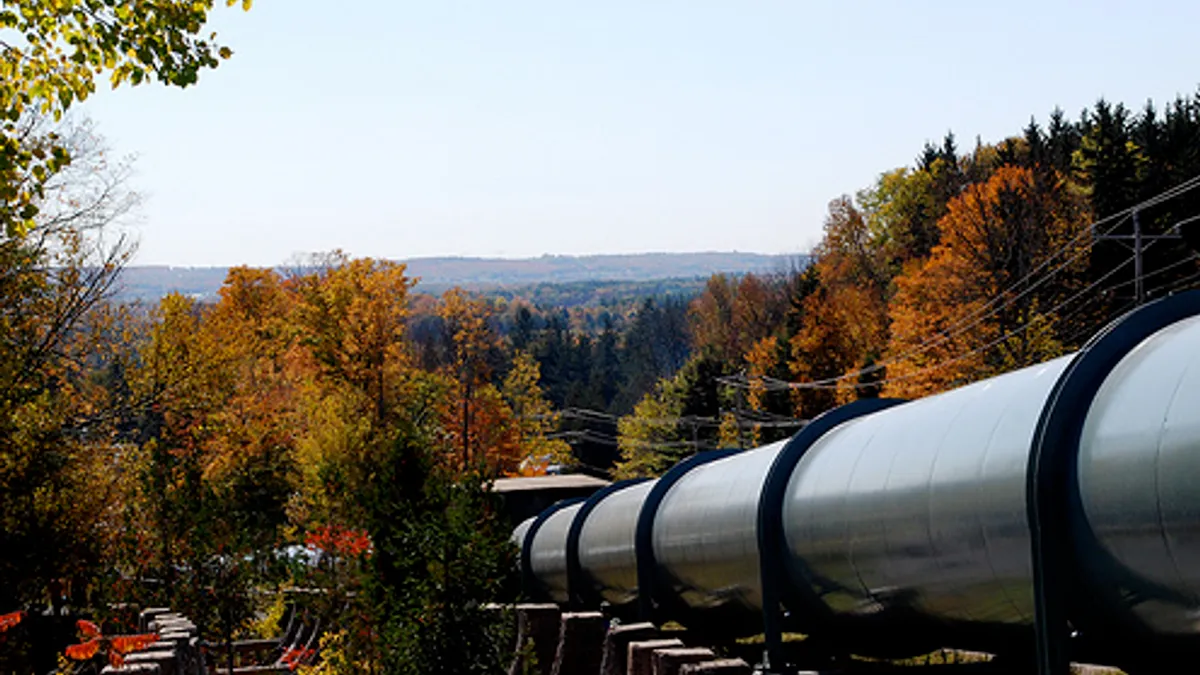Dive Brief:
- A new class action lawsuit filed by 12 New England power consumers argues Eversource and Avangrid unfairly raised electricity prices by artificially constraining capacity on the Algonquin natural gas pipeline over the past three years.
- The lawsuit, filed Nov. 14 in the U.S. District Court for the District of Massachusetts, charges the utilities raised power prices 20% by scheduling more capacity than they needed on Algonquin and then cancelling some of the orders later in the day, too late for the pipeline space to be resold. The lawsuit follows the publication of a report by the Environmental Defense Fund detailing the practice.
- The report sparked regulatory inquiries in Connecticut and Massachusetts, as well as a call for FERC to investigate from Sen. Richard Blumenthal (D-CT). The utilities maintain that the practice was not to manipulate power prices but to ensure they had adequate gas capacity to serve customers.
Dive Insight:
A class action lawsuit, filed by the firm Hagens Berman Sobol Shapiro LLP, is just the latest headache for Eversource and Avangrid over their pipeline practices.
Last month, Massachusetts utility regulators announced they would review the EDF report, following the lead of state Attorney General Maura Healey (D). Sen. Richard Blumenthal (D-CT) has asked the Federal Energy Regulatory to open an investigation into the utility behavior, and the Connecticut Public Utilities Regulatory Authority has opened an investigation. New Hampshire Consumer Advocate D. Maurice Kreis also called for further investigation in an op-ed.
The EDF report reviewed nodes on the Algonquin pipeline for more than three years, finding that the scheduling practices of Eversource and Avangrid differed significantly from other utilities.
This practice, referred to as down-scheduling, “essentially locks up some pipeline capacity,” said Matthew Zaragoza-Watkins, an assistant professor at Vanderbilt University and co-author of the report. On the worst days, including during the Polar Vortex of 2013-2014, up to 7% of Algonquin’s capacity could be artificially constrained.
The price impact, according to EDF, was significant. Over three years, researchers estimate the behavior cost consumers $3.6 billion in higher power bills, with about half the impact coming during the polar vortex of 2014.
The utilities don’t deny they engaged in the down-scheduling practice, but argue they did so to ensure they had adequate pipeline capacity available if weather conditions or other factors unexpectedly increased gas demand.
The utilities and their allies also claim the EDF report is biased — that it “appears to be fabricated by anti-pipeline proponents who are trying to make the case that pipeline shortages in New England are due to capacity withholding,” an Eversource communications manager wrote to Utility Dive.
“We are aware of the lawsuit and are reviewing it," Eversource said in a statement on the lawsuit. "However, the facts remain unchanged. The allegations underlying this lawsuit are untrue and baseless. The expenditure of resources to further these false claims is regrettable for all parties involved.”
The AP reports that court records show 12 ratepayers have signed onto the class action lawsuit, and that number could grow. On a webpage with case information, Hagnes Berman says the utilities' practices "served no other purpose than to artificially boost profits for these companies, leaving millions to pay higher bills."
“It appears these companies willfully engaged in this scheme for years, and we intend to help those affected reclaim their losses, and stop this behavior," Hagnes partner Tom Sobol said in a statement.














